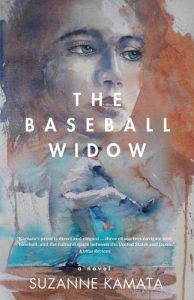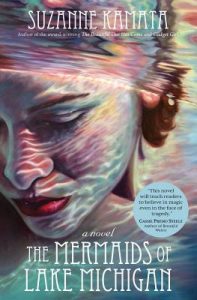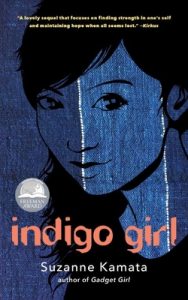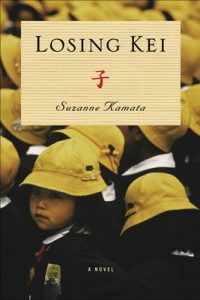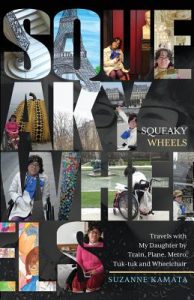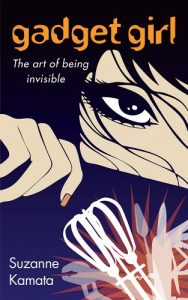Building Empathy and Bridges: An Interview with Suzanne Kamata
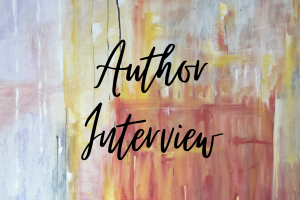 I first “met” award-winning author Suzanne Kamata years ago when I began working with Literary Mama. At the time, she intimidated me! A confident, capable, talented writer like her working with a relative newbie like myself? It was a lot to take in. And then I emailed her a publishing question and received a lovely reply along with the offer to answer any future questions. That interaction broke the ice for me, and since then, I’ve been keeping an eye on Suzanne’s career and reading her books. And those books are numerous! She’s written multiple novels and nonfiction books, has a short story collection and children’s picture book, and has contributed to multiple anthologies. In fact, I’m in awe with the pace at which Suzanne writes and publishes! Her latest novel, The Baseball Widow, released last October, and Work in Progress, an anthology Suzanne contributed to published just last week. Certain that Suzanne has more works in progress on the back burner, I’m especially grateful she took the time to answer my questions.
I first “met” award-winning author Suzanne Kamata years ago when I began working with Literary Mama. At the time, she intimidated me! A confident, capable, talented writer like her working with a relative newbie like myself? It was a lot to take in. And then I emailed her a publishing question and received a lovely reply along with the offer to answer any future questions. That interaction broke the ice for me, and since then, I’ve been keeping an eye on Suzanne’s career and reading her books. And those books are numerous! She’s written multiple novels and nonfiction books, has a short story collection and children’s picture book, and has contributed to multiple anthologies. In fact, I’m in awe with the pace at which Suzanne writes and publishes! Her latest novel, The Baseball Widow, released last October, and Work in Progress, an anthology Suzanne contributed to published just last week. Certain that Suzanne has more works in progress on the back burner, I’m especially grateful she took the time to answer my questions.
Christina: Congrats on all of your novels and other publications! I’d first love to chat a little about The Baseball Widow. What inspired this novel in particular? With so many works out there, where do you look for story ideas?
Suzanne: My first novel, Losing Kei, was published by Leapfrog Press in 2008. Then, the press was headed by Ira Wood and Marge Piercy, but I worked with Ira. He was—is—a big Red Sox fan, and knowing that my husband knew a lot about Japanese baseball (he was an all-star player in college and a high school baseball coach), our email discussions about my novel often veered into baseball. He wanted to know whether the Sox’s new player from Japan, Daisuke Matsuzaka, was worth all the money that he’d been paid, etc. Anyway, after we’d finished edits and so forth for Losing Kei, Ira suggested that my next novel be about Japanese baseball. His idea was that I would write it with my husband. There is no way that my husband would ever write a book with me, but he was willing to answer all of my questions, and I had already been quite immersed in the baseball life as the wife of a coach. I thought I could make use of our experiences and write something that had never been written in English before.
Christina: At the beginning of The Baseball Widow, Christine, one of the main characters, is leaving Japan for Thailand and worries that her relationship with her boyfriend, Hideki, might not last. Of course, we learn early on that it does last, and then Christine’s worries have increased to include a multiply-disabled daughter and a son, who is the victim of bullies. How do you find the right balance so that readers are intrigued and sympathetic but not overwhelmed by heavy themes?
Suzanne: That’s a good question, and I hope that I have indeed succeeded on that point. I don’t think I have a conscious plan, but some of my favorite writers, such as Lorrie Moore, Miriam Toews, and Louise Erdrich, manage to balance tragedy and humor quite well. I make an effort to be subtle, and I tend to be aware of the absurd, and hopefully that comes through. I’m not sure that The Baseball Widow has a lot of humor, but maybe readers will find the cultural differences intriguing and that will be a diversion from the heavy themes? I actually hesitated to publish this book because I thought it might be too dark.
Christina: Of course, with a title like The Baseball Widow, I have to ask: Do you like baseball? And did you have to do research on the sport? Did anything surprise you in that research or take you off track?
Suzanne: Well, yes, I do like baseball, but I’m not a super fan. When my husband was a baseball coach, I gladly attended his games, and I went to watch my son play whenever I could. I sometimes get caught up in the annual high school baseball tournament at Koshien. Like I said, as the wife of a high school baseball coach, I was pretty much immersed in baseball life, so I didn’t do all that much research, I taught English at a few high schools in Japan, and I saw how the players were treated, and I saw how they practiced, running around with tires yoked to their shoulders at 7 a.m. and whatnot, and how they were treated—and how they treated me! I did read a couple of books by Robert Whiting about baseball in Japan, You Gotta Have Wa and The Meaning of Ichiro, and I have watched the documentary Kokko yakyu several times. Mostly, I was interested in the minutiae, like, the female managers making rice balls for the players, and the ceremonial baseball dropped from a helicopter at Koshien.
Christina: Much of your work centers on multiculturalism and characters with differing abilities and brings them to light, demystifying myths and obliterating stigmas. What messages do you hope your readers walk away with? Do you think you’ve been successful?
Suzanne: It may sound corny, but I have always hoped to show how we are all in this together, how people are more alike than not, even if they are from different cultures and have different abilities. I want to build empathy and bridges. Also, I wanted to create mirrors for my kids and others like them. There are not so many novels about multicultural biracial families.
Christina: You’ve been publishing for a long time. What changes have you seen over the last five years or so? Do you have any tips for emerging writers or those more established writers who might be flirting with self-doubt?
Suzanne: As I am sure you know, there is a bias toward books written by so-called #ownvoices writers. That hash tag is apparently no longer acceptable, but it means that, for example, many editors and publishers would rather not consider a book about Japan written by a white woman like me. I am no longer eligible for some of the awards that I won in the past. I have had kind of an identity crisis as a writer over these past few years. I wasn’t really sure what I should be writing about. But I dealt with that by kind of stepping back from the chatter on Twitter and all of the other noise in publishing, and writing what I felt called to write. It may or may not be publishable, but I think it can be damaging to one’s sense of self to always be thinking about publishing. There are always going to be trends, and eventually, I expect that things will even out. But I do hope that we will continue to see books by many different kinds of people succeed.
Christina: Your Amazon bio states that among other things, you love cats. I’ve learned that I have to ask about the cats because, well, CATS! Do you own cats? If so, can you tell us a bit about these feline friends? If not, have you owned cats in the past? What’s so endearing about them? Do they inform your writing?
Suzanne: I do love cats! We have two cats, both rescued as kittens. One is Sumi, a moody black American longhair that came to us through my husband’s veterinarian friend. The other is a very sweet, sometimes sassy Siamese cat called Mii, found by son down by the river near our house. While I was having the aforementioned doubts, I wrote a lot of things about my cats. Cats have appeared in a couple of my poems, an essay, and a recent short story. My work-in-progress, however, features a dog.
Christina: What does literary success look like to you?
Suzanne: Of course I would love to see one or more of my books made into a movie or TV series, and I would love to see my work reviewed in the New York Times Book Review! But I think being able to continue writing and publishing, even if only for a small audience, is success to me.
Suzanne can be found in multiple places!
Website: https://www.suzannekamata.com/
Facebook: @SuzanneKamata
Instagram: @suzanne_kamata
Twitter: @shikokusue
Thanks to Suzanne for agreeing to this interview! If you know of an author who’d like to be featured in an interview (or you are an author who would like to be featured), feel free to leave a comment or email me via my contact page.

